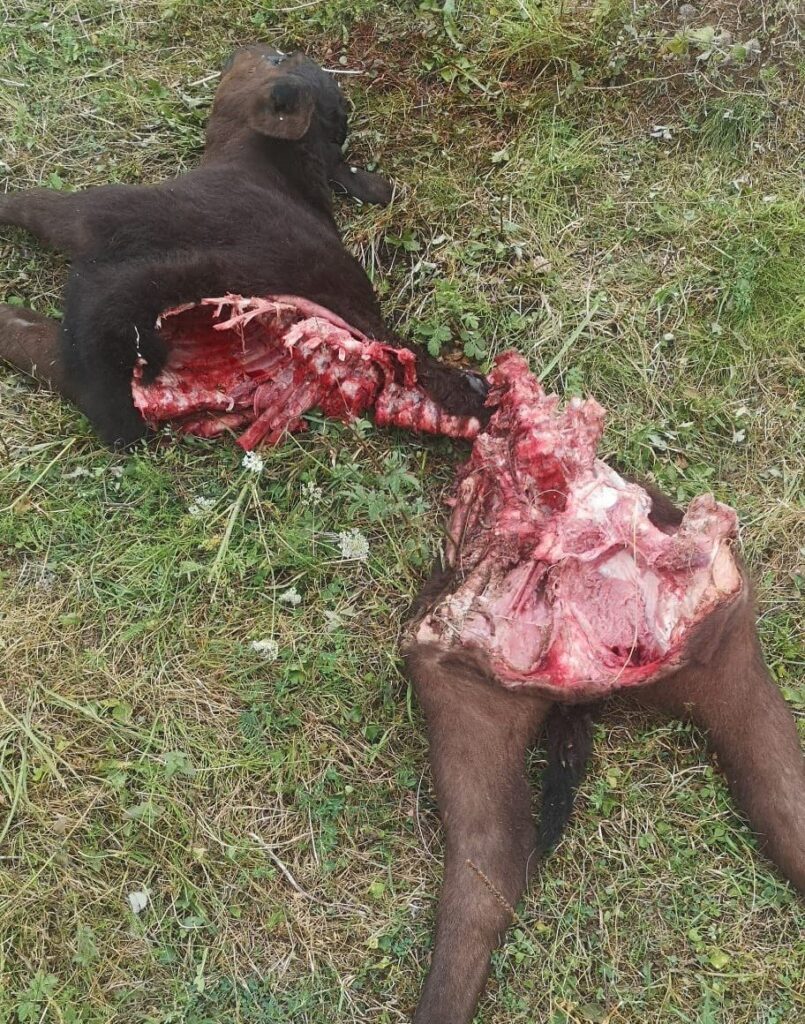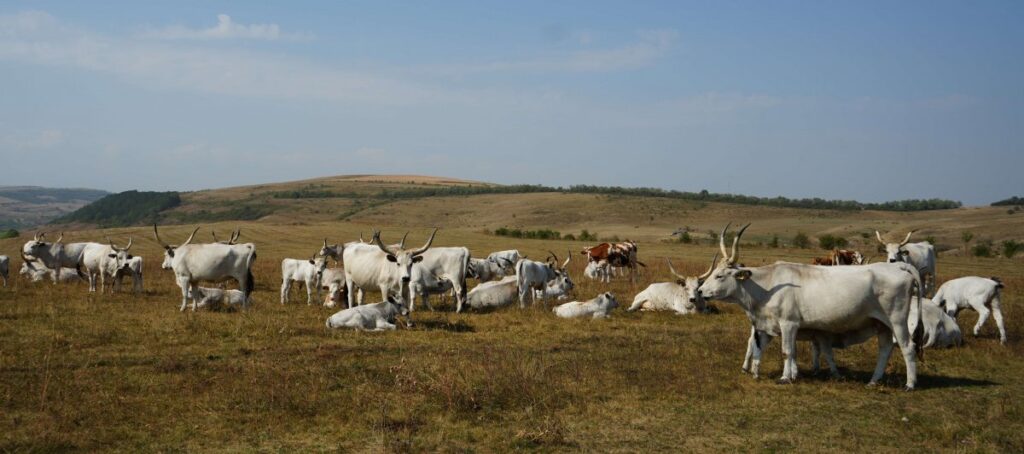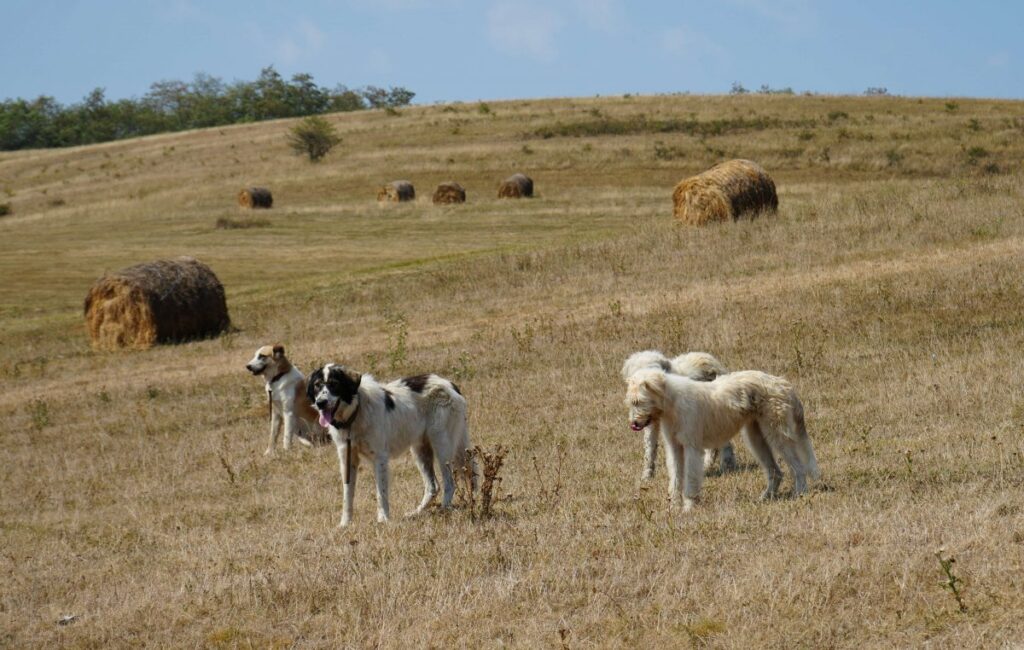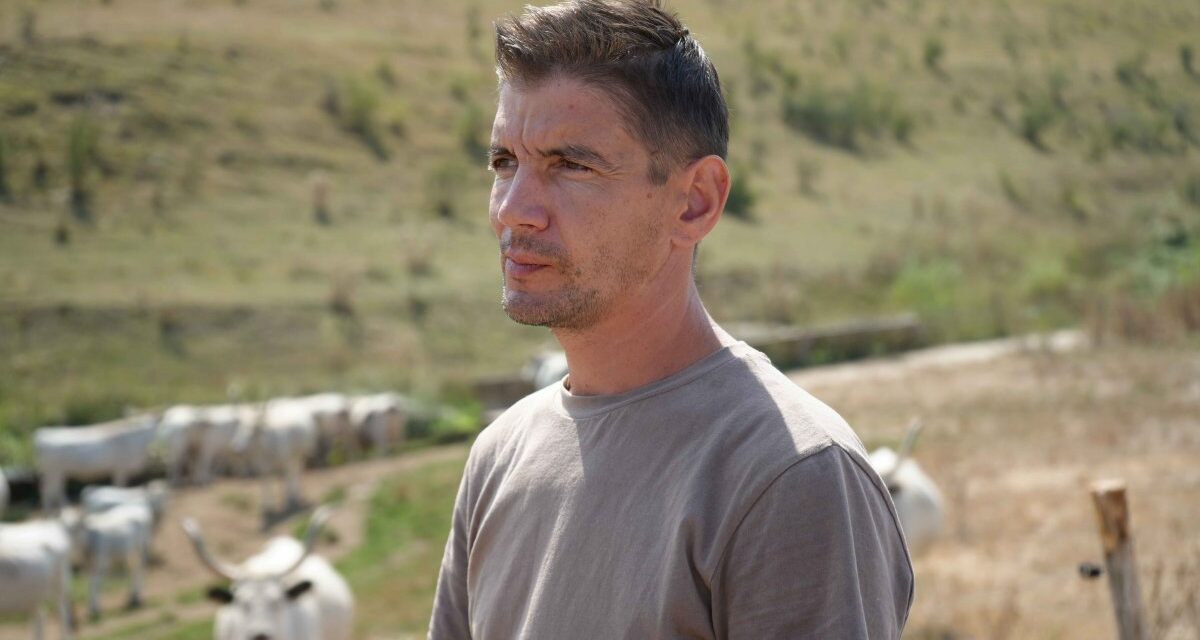Kalotaszeg report on the lack of a way out for livestock keepers.
A farmer from Mákófalv, who keeps Hungarian gray cattle and French beef cows, raised the alarm in the last few weeks about wolves killing ruthlessly in the pastures of the Kalotaszeg villages. He has not yet received any money after the wolf packs that destroyed around fifty calves from his herd in one year, but he does not hold out much hope for state compensation. The farmer, who has been involved in animal breeding for ten years, is also featured in a video compilation.
Through a burnt, dry field, we approach the one-hundred-hectare pasture of Mákófalv cattle farmer Levente Kovács, surrounded by an electric fence, on the border of Magyargorbó. The farmer from Kalotaszeg keeps his meat cows free-range in four places, and his leased pasture is the largest here.
The people in the area marveled at the breeding animals with huge horns imported from Hungary, because five years ago this was the only herd of gray cattle in Kalotaszeg.
Many people talked about Levente Kovács's "recklessness", since the native Hungarian cattle breed, which has a wild nature, is difficult to handle, and its fattened calves are not readily bought by slaughterhouses in Romania. The meat processors here have only recently made friends with gray beef, which is considered the favorite meat of Hungarian restaurants, but that is not why my host is upset. According to his definition
"He has managed to sell the calves that the wolves leave behind". His biggest problem is the big loss due to wild game damage.
In the villages of Kalotaszeg in the Nádas region, the attacks of wolves have become increasingly unbearable in the last two or three years: there is hardly a farmer whose sheep or cattle have not been decimated by the wild animals. It is difficult for Levente Kovács to say the terrible number, but he has lost around fifty calves since last fall. Usually nothing is left of the day-old animals: two or three wolves carry it off, and you can find out what happened from the desperate search of the cow. Only the larger calves have some evidence, the number of ears, pieces of bone and skin.

Photo: Krónika/Levente Kovács
The Mákófalv farmer does not have high hopes for state compensation, because the bureaucracy is too great, and he does not have time to search for evidence, sometimes for days through ditches and bushes in the nearby forest or neighboring pastures. He sees the real solution as being able to regulate the wolf population so that livestock farmers can finally work in peace.
In fact, the loss of the calves of gray cattle cows is the smallest, because when the wolves approach, the mother and father animals stand in a circle in the pasture, and the calves flee to the middle of the circle, to a safe place. Wild animals do not dare to approach the herd of cows, the defending cows gobble up the attackers in seconds. With the herd of gray cattle, the wolf resorts to a cunning ruse: in the summer, he catches the calves wandering away from their mothers and resting in the shade of a bush or tree. At this time, they pounce on the calf, avoiding the attention of the grazing cow, and by the time the mother regains consciousness, the calf is killed.
"The damage is much greater in the Angus and Aubrac herds used for meat of French origin, where the ancient defensive instinct has not been preserved in the mother animals, so the loss of calves that are sufficient on pasture is much greater. Animals left alone are sniffed out by the wolves lurking nearby and dragged away, nothing remains of the victims" -
the farmer from Mákófalv sums up the sad sight.
He started as a bus driver and continues as a cattle rancher
Levente Kovács, who used to work as a bus driver on international flights from Cluj-Napoca to Budapest, committed himself to animal husbandry more than ten years ago, because he was tired of his tiring work involving constant overnight stays. He initially started with sheep farming, then switched in 2019.
"I transported tourists to Hortobágy, then I saw the Hungarian gray cattle up close. I was so impressed, I liked the herd, that I decided to buy such breeding animals"
– the farmer from Kalotaszeg summarizes the history of the change. He wanted to buy the 110 breeding animals offered for sale together with an acquaintance, but at the last moment it turned out that the other buyer from Transylvania backed out, so he had to pay the entire purchase price. He put all their savings into it, but according to his confession, he has no regrets, he is glad he took the plunge, because dairy farming became his real passion.

Oláh-Badi Levente/Chronicle
While the farmer is constantly watching the behavior of the cows and two bulls out of the corner of his eye, lest any of the animals run towards us - cows protecting their calves are sometimes unpredictable - he talks about the conditions of the animals. The undemanding livestock consumes all feed, does not suffer from extreme heat or cold, is used to cold keeping, so it feels good even on burnt pasture, finds feed for itself, and needs little supplementation. In contrast to meat-utilizing Western breeds, which require a lot of treatment and more feeding.
According to our host, wildlife damage wouldn't be such a problem if there was a shepherd to guard the animals, but this seems like a utopia today. Those who raise cattle usually keep their animals on pastures guarded by electric herders and come out to their herd once a day, which the wild animals can sense.
"You can't find a reliable herdsman, someone who wouldn't sell the farmer's calf for a bottle of brandy, on the other hand, there is no electric herdsman against the wolf, the game hides under the wires or jumps over them. The solution would be pastoral guarding reinforced with sheepdogs, but these days this is only possible for flocks of sheep, and it is very difficult to find people there."
the man spreads his hands.

Photo: Oláh-Badi Levente/Chronicle
Levente Kovács returns to his tractor to finish mowing the fodder fields next to the new railway line between Cluj-Napoca and Nagyvárad. This year, every blade of hay is worth a treasure, because due to the great drought, we managed to harvest less fiber fodder than in other years.
When we leave, we once again graze through the herd of cows with huge horns grazing peacefully, meanwhile the shepherd dogs of the sheep flock approach us from the neighboring pasture. Sheep farming is in a slightly better position, because dogs provide more protection against wolves, but according to farmers, the Kalotaszeg sheep flocks are also being decimated by the predator. Levente Kovács is especially happy to have the neighboring shepherd's company, because at least there is someone who looks after his cows during the day.
Featured image: Oláh-Badi Levente/Chronicle













